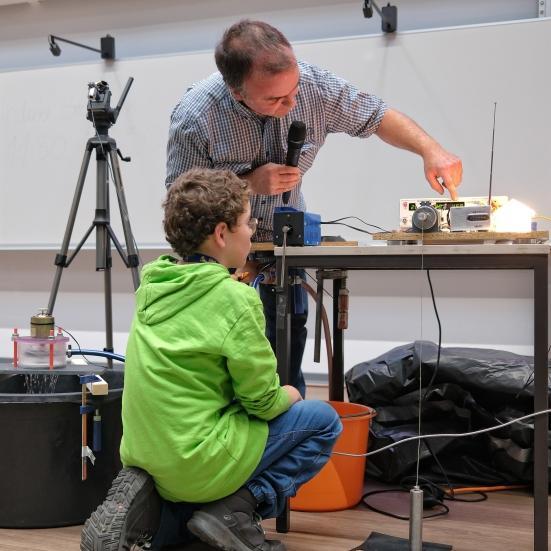"Hydropower is the most proven energy in the world"
A hydroelectric power plant converts the positional energy of water into electrical energy by directing the water at high speed onto a turbine that generates a rotary motion. This rotary motion drives a generator, which converts the mechanical energy into electrical energy. This allows machines to run. The hydraulic engineers (Water and Environment Research Institute) Prof. Dr. Jorge Leandro and Dipl.-Ing. Jörg Wieland showed the children's university children exactly how this works in the large lecture hall of the Unteres Schloss lecture center.
First, Prof. Leandro explained the water cycle: Water evaporates over seas and lakes, rises into the atmosphere as water vapor, where it cools to form clouds (condensation). These clouds allow the water to return to earth as precipitation (rain, snow). There it collects in bodies of water, seeps into the ground as groundwater or flows back into the sea via rivers, starting the cycle all over again. Hydroelectric power plants can be built on rivers and in the sea. They use the power of water to generate energy.
Dipl.-Ing. Jörg Wieland had set up two experiments in the lecture hall. A child at the children's university operated a hand-crank dynamo. When idling, the crank turns very easily. If a lamp is connected to it, it is more difficult to turn the crank. The manually generated energy flow is not constant, the lamp flickers noticeably. Wieland: "In principle, this also works with hydropower, but then much more evenly." However, small systems are very expensive to operate; only large hydropower systems pay off. A kilowatt hour of electricity generated with fuel costs between 3 and 5 cents. The electricity generated in large hydropower plants is also in this cost range. Electricity generated by a medium-sized hydropower plant costs around 10 cents per kilowatt hour.
In Germany, 70 percent of electricity comes from renewable energies. Worldwide, this figure is just 30 percent. Leandro: "The expansion of new technologies is expensive." Only Iceland and Paraguay generate 100 percent of their electricity from renewable energies. However, this is important in order to curb the greenhouse effect and increasing global warming. Warmer air can store more water vapor. This can lead to more extreme weather events.
Engineers are working on solutions to counteract this development. This was also the case in the past. Lester Allan Pelton (1829 - 1908) is considered the father of hydropower. He developed turbine wheels with differently shaped blades. The Walchensee power plant in Kochel am See in Bavaria has been in existence since 1924 and generates 300 million kilowatt hours of electricity every year with the help of Pelton turbine technology. By way of comparison, one kilowatt hour can be used to wash a washing machine, iron 15 shirts
or light a 60-watt light bulb for 17 hours. The annual energy output of the Walchensee power plant is therefore enough to iron around 4.5 billion (!!) shirts.
In the lecture hall, the tap was turned on in front of the turbine nozzle. And lo and behold: the small model house was also illuminated by means of a turbine and generator, a radio was made to work and a heavy weight was lifted with the help of a winch - only now without the fluctuations in current intensity caused by the electrical energy generated by the hand crank. The scientists gave the children an equation to take home with them: hydropower = head times flow rate. This means that the drive energy required to operate the lamp can be provided with a high pressure head at a low flow rate, or with a lower pressure head at a higher flow rate. This fact is very important for the selection of the most effective turbine type: the turbine must be adapted to the water supply (= existing pressure head or head and the available flow); this is done by hydraulic engineers. Hydropower is also environmentally friendly. To generate one kilowatt hour of electricity, 921 grams of carbon dioxide are released with coal, 33 grams with solar energy and 15 grams with hydropower. Leandro: "Hydropower is the most proven energy in the world."

